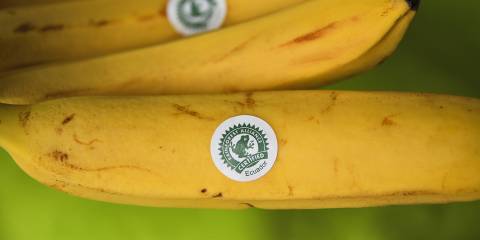Eighty one percent say the Fair Trade Certified label encourages them to buy that product.
Companies’ commitment to direct and equitable trade, along with sustainable use of natural resources, has come a long way from “Third World” handicraft shops that popped up in the late ‘50s.
The History of Fair Trade
“Consumers want to know a product’s history, from farm to shelf,” says Paul Rice, president and CEO of TransFair USA, the nonprofit responsible for Fair Trade certification in the United States. “In the midst of the deepest recession of our generation, this sentiment is stronger than ever—it’s proof that we’ve entered a new era of ethical consumerism.”
How and When Did Fair Trade Start?
Certification for fair trade with workers in developing countries began in the ‘80s. In 1997, an international umbrella group known as Fairtrade Labelling Organizations International began monitoring and certifying bananas, cocoa, coffee, honey, orange juice, sugar, and tea from producer co-ops. Today this label appears on an even wider range of goods—from body care to ice cream and wine.
Coffee Starts it All
Coffee was the first commodity in the US to be independently monitored, guaranteeing a fair wage and decent working conditions for farmers around the world.
Second only to petroleum as the world’s most valuable traded commodity, coffee was traditionally a colonial cash crop, planted by serfs or wage laborers who were bound to a cycle of poverty and debt.
How Fair Trade Helps Farmers
Fair trade doesn’t offer coffee workers a handout—only equitable pay.
-
Floor Prices
A floor price acts as a safety net, protecting small farmers when fluctuating world prices fall too low.
-
Co-ops and Direct Sales
Fair trade supports grower co-ops, so its farmers don’t have to sell to “coyotes,” middlemen exporters who take a higher percentage of the sale price.
-
Environmental Health
Certification provides much-needed credit to farmers and technical assistance in transitioning to organic methods, and encourages environmental stewardship.
-
Community Growth
Certification also supports community development for the health and education of workers and their families.





